| Activists Respond to Detentions, Church-Led March with Satirical Performance on Anti-Homophobia Day |
| Civil Georgia, Tbilisi / 17 May.'16 / 19:57 |
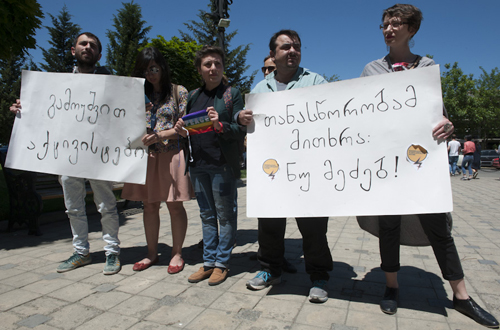
Demonstrators hold banners outside the Tbilisi City Court calling for the release of detained activists, May 17, 2016. Photo: Eana Korbezashvili/Civil.ge
Ten LGBT activists were arrested by the police before dawn on Tuesday for making graffiti “all love is equal” outside the Georgian Patriarchate’s premises in Tbilisi and painting streets in rainbow colors to mark International Day Against Homophobia and Transphobia.
The activists – seven of them arrested outside the Patriarchate and three others close to the Freedom Square – were charged under the article 150 of administrative offenses code, involving making unauthorized inscription or painting on public places. Some activists were also charged with disobeying police orders, which they deny and say that they were arrested by plainclothes police.
Three of them were released earlier on Tuesday and seven others late afternoon on the same day; but the court has yet to decide whether to fine them or not.
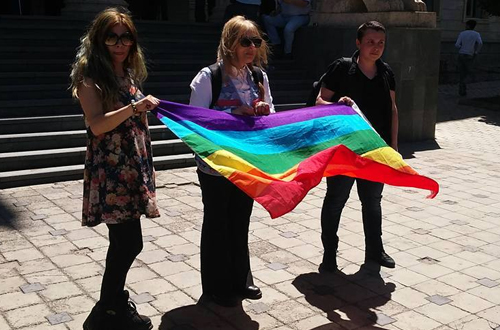
Demonstrators hold a rainbow flag outside the Tbilisi City Court in support of detained activists, May 17, 2016. Photo: Lado Gogiashvili
Three years ago on this day a small group of activists, who wanted to mark anti-homophobia day on Freedom Square in the Tbilisi center, was attacked by thousands of anti-gay demonstrators, led by Orthodox clerics.
In an attempt to counter the International Day Against Homophobia, the Georgian Orthodox Church introduced in 2014 the Family Day on May 17, marking it at the time with a huge procession in downtown Tbilisi, which turned into anti-gay demonstration. Fearing homophobic violence, LGBT activists decided not to mark anti-homophobia day with outdoor rally in 2014. In 2015 the activists marked the International Day Against Homophobia at various locations in the city, including at Mrgvali Bagi (Round Garden) in the Vake neighborhood under the heavy police presence.
This year a group of LGBT activists wanted to gather on the Rustaveli Avenue or Freedom Square but the request was declined by the authorities citing that the venues was already booked for procession by Orthodox groups to mark the Family Day. The LGBT activists were instead offered to mark the anti-homophobia day at a different location, including Mrgvali Bagi; but the offer was turned down in protest over the authorities’ failure to provide security guarantees on the location they were insisting on.
“Attempts by various political, social and religious groups to monopolize public space are not confronted by the state with a policy based on human rights and equality, thus encouraging xenophobic and homophobic groups,” several civil society groups said in a joint statement on May 17.
“In the condition of ineffective anti-discrimination state policies, [LGBT] community… is left defenseless in the face of violence,” reads the statement by eight organizations, among them Georgian Young Lawyers’ Association; Human Rights Education and Monitoring Center; Identoba; Women’s Initiatives Supporting Group; Open Society Georgia Foundation.
Public Defender, Ucha Nanuashvili, expressed regret in a statement that International Day Against Homophobia and Transphobia “cannot be celebrated in the open air.”
“It is worrying that homophobic attitudes in the society pose threat to exercising constitutional rights… I call on the authorities to do their best to prevent hate-motivated violence and manifestation of homophobic actions, as well as to promote unconditional implementation of constitutionally guaranteed rights and freedoms of LGBT persons,” the Public Defender said and also called for a probe into allegation that police used homophobic language when arresting 10 activists earlier on Tuesday.
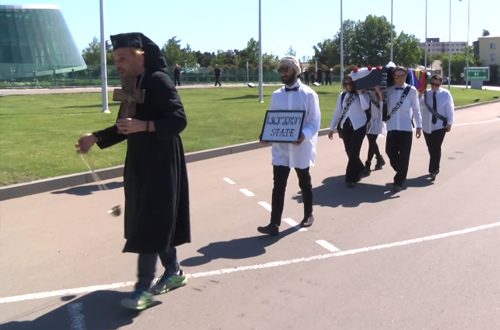
A screengrab from YouTube video showing activists stage a performance outside the Interior Ministry headquarters, involving mock funeral procession, in protest of violation of LGBT rights in Georgia, May 17, 2016.
Some activists staged a satirical performance to express their protest. In a performance outside the Interior Ministry headquarters, a man, dressed like an Orthodox priest, was leading a mock funeral procession, with others carrying a mock coffin of the state symbolizing the authorities’ failure to provide security guarantees to those who were willing to mark the anti-homophobia day on the Rustaveli Avenue.
In a separate protest, several activists brought a stool painted in rainbow colors outside the Radisson Blu hotel in Tbilisi, where delegates of the World Congress of Families (WCF) were holding annual summit.
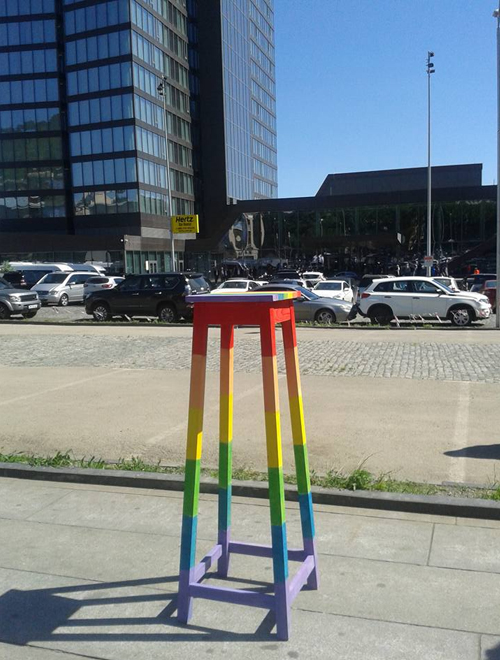
Rainbow-colored stool outside Radisson Blu hotel in Tbilisi, May 17, 2016. Photo: Eka Chitanava
Stool became associated with the 2013 homophobic violence as one Orthodox cleric was chasing gay rights activists with a stool in his hand, slamming it into a bus, which was evacuating activists from the scene of disrupted anti-homophobia rally. Mariam Kvaratskhelia, one of those who brought the rainbow-colored stool outside the WCF conference venue said it was in protest against WCF, which, she said, spreads homophobia, representing “part of Russian propaganda.”
Participants of the WCF conference joined the Georgian Church-led procession on the Rustaveli Avenue towards the Holy Trinity Cathedral, marking the Family Day.
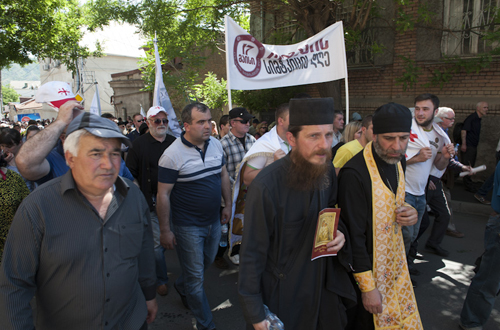
Participants of a procession organized by the Georgian Orthodox Church hold a poster reading “May 17 is the Day of Family Strength”, Tbilisi, May 17, 2016. Photo: Eana Korbezashvili/Civil.ge
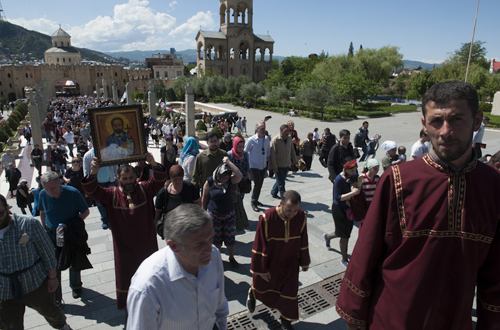
Participants of the Family Day procession organized by the Georgian Orthodox Church arrive at the Holy Trinity Cathedral, Tbilisi, May 17, 2016. Photo: Eana Korbezashvili/Civil.ge
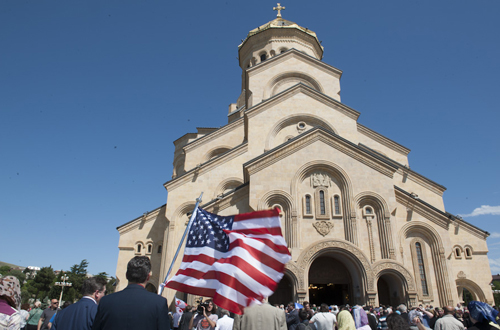
A delegate of the World Congress of Families (WCF) annual summit in Tbilisi, which gathered participants from around the globe, including Europe, U.S., and Russia, carries the U.S. flag while participating in the Georgian Orthodox Church organized Family Day procession towards the Holy Trinity Cathedral, May 17, 2016. Photo: Eana Korbezashvili/Civil.ge
A local host of the conference, businessman Levan Vasadze, addressed the summit on May 16 with a 30-minute speech, broadcast live by the Tbilisi-based Maestro TV, in which he accused the West of “poisoning” Georgian youth by promoting “aggressive liberalism” through western-funded non-governmental organizations. In the speech he also slammed ex-President Mikheil Saakashvili’s “bloody regime”, which, he said, was supported by the western powers.
“Instead of freedom of speech we received total dictatorship of liberals in our press and television and education institutions,” he said on May 16 in the Tbilisi Philharmonic Hall, which was hosting the second day of WCF conference in presence of Head of the Georgian Orthodox Church, Patriarch Ilia II. Some politicians, including leader of the opposition Democratic Movement party Nino Burjanadze and at least three lawmakers from ruling GDDG party Omar Nishnianidze, Zakaria Kutsnashvili and Davit Lortkipanidze, were also present.
“If anyone dares to speak out against these policies of the West in Georgia, they are immediately accused by western-funded liberal politicians, media and NGOs of being Kremlin spies,” Vasadze said.
Referring to 2013 attempted anti-homophobia rally, he said that the West was supporting staging of “propaganda of anti-traditional values” in the center of Tbilisi and when “our society countered this attempt and kicked shameless propagandists out of the square, western diplomats starting shouting concerns that our society was not accepting this proposed parade of shamelessness.”
While praising some of the policies of the current government, he also criticized it for adopting anti-discrimination law in 2014, which he said was imposed by the West and which “even the previous regime could not dare to adopt.”
“Instead of freedom we received prison, terror, debauchery and injustice and as a result idol of West has fallen in Georgia,” Vasadze said.
“The West has already de facto lost Georgia as a result of its attacks on our traditional society… Remnants of Western influence in Georgia are now based on its so called support towards Georgia’s territorial integrity in the condition of Russian occupation. The day when the Kremlin finally realizes that it has to lead reconciliation between Tbilisi and Sokhumi, and Tbilisi and Tskhinvali will become the day when the West loses Georgia once and for all,” he said and added by addressing the western governments: “Stop this madness immediately and stop interfering in sovereign state’s affairs; stop funding permanent attacks through hundreds of your NGOs on our Church and families.”
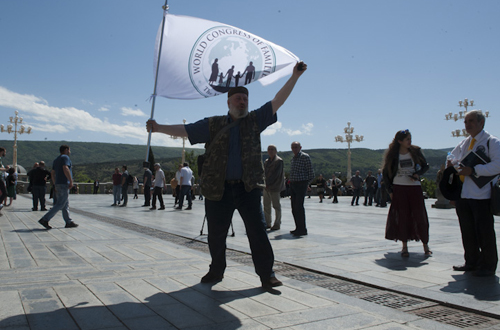
Participant of the Family Day procession holds a flag of the World Congress of Families (WCF) outside the Holy Trinity Cathedral, May 17, 2016. Photo: Eana Korbezashvili/Civil.ge
A group of Georgian human rights organizations said in their joint statement on May 17, that the homophobic rhetoric voiced at the WCF conference in Tbilisi echoes the one of the Russian government and the Russian Orthodox Church, which try to instrumentalize LGBT and gender issues for political purposes and to spread the same approach in neighboring countries. Because of that, the groups said, the same problem of “politicizing LGBT issues in Georgia should not be considered only as a problem of homophobia.”
The Georgian Parliament is expected to start debating on a constitutional amendment, pushed by the GDDG ruling party, which would ban same-sex marriage – something which is already banned by the civil code in Georgia.
President Giorgi Margvelashvili said on May 10 the proposal to define in the constitution that marriage as union of a man and a woman “is not an issue” at all in Georgia and it was only floated for the purpose of diverting public attention from real problems in the country.
Rights groups say the initiative is a “populist” move ahead of the parliamentary elections aimed at winning support of Georgia’s predominantly conservative society. Rights activists also say that the initiative was further marginalizing LGBT community and causing further rise in homophobic sentiments in the country.
